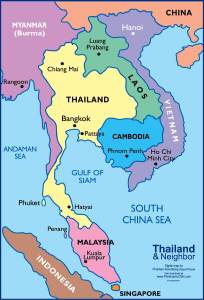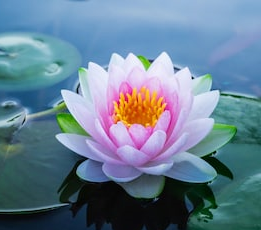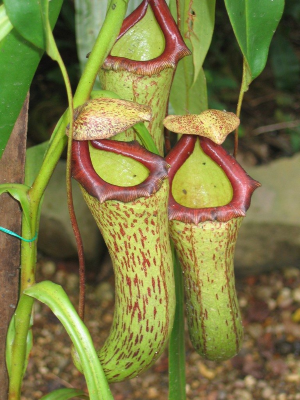
I have had the great pleasure of traveling in Thailand and I highly recommend it. It is a beautiful country with amazing people. Thailand is in the heart of Southeast Asia. It is bordered by the Andaman Sea, Gulf of Thailand, Indian Ocean and the countries of Burma (Myanmar), Loas, Cambodia and Malaysia.
Climate in Thailand
Given Thailands proximity to the Equator the climate is Tropical and it is hot, year round. In addition, during the rainy season (May through September) rain falls almost every day at some point during the day. The moist and humid weather are a big contributor to the diverse horticulture and wildlife.

Lotus flowers are common and the favorite flower in Thailand. But it is not alone when it comes to beautiful flowers in Thailand. For example, Orchids Frangipani, Krachiao, Jasmine, and Hibiscus are all part of the landscape.

And that’s only the beginning. In the jungle and rain forest you will see carnivorous (meat-eating) plants such as the mysterious Pitcher plant which eats mostly flying insects.
Even deeper in the rain forests are there are tigers, elephants, leopards, cobras and Malayan Tapir.
Family Comes First in Thailand
Family is first and foremost with the Thai people. It’s very common for extended families to live together or close to each other. It’s fairly common for adults to need to move around for work. Grandparents and Aunts or Uncles frequently raise children when their parents must move around for work. Young family members are must take care of the older members of the family. This can be financially, or by doing a range of chores. Additionally most Thais maintain strong links with their home villages even if they move away permanently for work.
Meeting and Greeting in Thailand
As with most cultures the people of Thailand have specific customary ways of greeting each other. The wai (pronounced “why”) is the traditional greeting of Thailand. Essentially, the palms of the hands are momentarily pressed together in a prayer-like gesture with fingers pointing upwards, usually close to the chest, and the head slightly bowed. The wai greeting is usually paired with the Thai word for “hello” which is sawasdee.
Wai is a Primary Greeting in Thailand but Also a Show of Respect
As well as a way of saying hello and goodbye, the wai is ultimately a sign of respect. Most Thais will also wai to temples, important monuments, pictures of Thai royalty, and spirit houses that guard properties, businesses, and roads as they pass. All wpais are not the same and the different gestures generally relate to who the other person in the greeting. Fore the most part, the position of your hands is indicative of the level of respect within the classic Thai greeting. The starting position of the wai is with the wrist either touching or near the chest. As the head nods the hands move up to various points of the face depending on the individuals status.
More Cultural Ettiquette-Do’s and Don’ts in Thailand
Do’s
- Remove your shoes: As in most Asian cultures, removing your shoes before entering a temple or visiting someone’s home is essential. Many businesses, such as shops and restaurants will also ask that you remove your shoes. If you aren’t sure whether you need to take them off or not you can just look at the staff or check to see if there is a pile of shoes at the entrance. (It’s a good idea to wear simple shoes when in Asia)
- Return a wai: The wai is Thailand’s greeting. To not return a wai is considered impolite; only the king and monks do not have to return wais. If your hands are full then a slight bow will suffice.
- Use your right hand: The left hand is considered dirty. It is the designated hand for “toilet functions.” Thus you should always use your right hand to pass objects to someone else, even when paying.
- Eat with a spoon: The proper way to eat in Thailand is with a spoon in your right hand. The left hand is only for raking food into the spoon with a fork. The fork never goes into the mouth. People only use Chopsticks for noodle dishes and treats such as spring rolls.
- Show respect to monks: You will encounter many monks in Thailand especially in areas in and around Chaing Mai. They are common place in cafes and walking around town. Always treat Monks with the highest regard. When greeting a monk you need to understand that they receive a higher wai than ordinary people. Also, monks do not have to return your gesture. In addition, women should never touch a monk, brush a monk’s robes, or hand something to a monk.
- Smile: The Thai people are famous for their smiles. Smiling is an essential part of Thailand etiquette. Always return someone’s smile.
Don’t
- Don’t point your feet: Feet are just a big deal in Thailand. They are considered very dirty and you should not show them to other people. In addition, don’t point your feet at someone; it is considered rude. I am not sure how to avoid that when you are facing someone but that’s the deal. Additionally, avoid pointing feet at Buddhas in and outside of temples. When sitting on the ground, try to sit in a way that doesn’t show others the bottoms of your feet. And Oh my goodness don’t out your feet up on a desk or chair.
- Don’t touch someone’s head: While the feet are considered the lowest and dirtiest parts of the body, the head is revered as the most sacred. As such, you should never touch someone’s head or hair – that includes playfully ruffling a child’s hair.
- Don’t point: Pointing at someone is considered rude in many cultures but particularly so in Thailand. If you must indicate a person, do so by lifting your chin or pointing your lips in their direction. If you must use your hand for pointing be sure to point with your whole hand rather than a single finger.
- Don’t lose your cool: Shouting, crying or displaying strong emotions in public is generally frowned upon in Thailand. Keep your cool even when things go wrong; you’ll be respected for doing so. Instead of getting angry try to laugh things off.
- Don’t ever disrespect the king: Never disrespect the king or even images of the king, this includes currency because his picture in on the Thai Baht. Disrespecting the king in any way can land you in jail. People have received lengthy sentences for Facebook posts that spoke out against the monarchy.

